The city of Portland, Maine, suffers from confusion with its west coast counterpart, the hip town of Portland, Oregon. Though it presents a sleepy facade, there's a bustling art and activist scene to discover once you scratch the surface. I visited during an ice storm which froze the town, but warmed the citizens.
THE LIGHTS of the eastern seaboard glow like phosphorus in seawater as I fly in to Portland. We land early, so I spend forty minutes studying tourist brochures near the baggage carousel of the curiously-named Portland International Jetport. With a name like that, one might expect a futuristic launching pad for galactic travels, rather than a sleepy six-gate regional route-ender. “Welcome to Maine,” a sign read in an ugly bold and rounded san-serif. The bored tourist information lady exchanges weather reports with a lazy janitor leaning on his mop. They discuss meteorology like mariners here. “I hear we’re in for a nor-wester at ten knots.” “That’s what they say. It’s already 10 outside.” I brighten at the prospect of a 10 degree night in mid December, forgetting for a moment that they’re talking in Fahrenheit, not Celsius. Upon the realization, I pull my scarf tighter.
I GAVE UP paying for accommodation several years ago. There’s no need, when people are willing to shelter you for free. You must simply be prepared to lower your standards of comfort, and be ready to meet some interesting characters. “You never know who you could run into,” one relative told me once, shocked at my open attitude toward my travelling arrangements. To which I replied – “That’s precisely the point.”
Through couchsurfing.com I meet Ani, who described her living space as “the loft of a collectively-run art space.” Called The Dooryard, the space is a ramshackle two-floor zone of free thinking and creation. Its walls are plastered with posters, the air thick with the smell of cooking oil wafting from the restaurant downstairs. Home produced zines – typewritten and photocopied – are scattered about on bench space. On the first floor is a large hall with several old couches facing a stage and a well-used upright piano. Upstairs is a rehearsal studio, a work room and a crusty kitchen.
I arrive at the tail-end of a meeting of Earth Firsters, a radical environmental defence group. “We’re planning some actions to challenge the timber industry in the north of Maine,” one of the black-clad activists tells me, Pabst beer can in hand. “Up there the logging companies are spraying so many chemicals it’s killing the earth. Heard of Agent Orange? Well, they’re spraying the same shit to defoliate forests here as they did in Vietnam. The families up there who have logged the forests responsibly for generations are seeing their environments destroyed overnight.”
Portland is a small town, and it’s the biggest in Maine. Most of the locals I meet have a refreshing attitude – they are savvy, liberal north-easters, yet they carry the calm understanding infused from their natural surroundings. There’s an unquantifiable reckless streak in them. “This is a frontier state,” one tells me, “Or, as close to frontier as you’ll find in the east.”
Despite their liberal leanings, some are quite rural. I overhear a conversation about firearms. “I knew I was back home in Maine when my friend invited me around to check out her gun.” In Maine, when someone shows you the long side of their gun, it’s a sign of friendship.
I locate Ani, my host, a bright girl with a head of dreadlocked brown hair and glasses with thick black plastic rims. As we set out on a walk to find dinner, she tells me of her recent trip across the country, hopping freight trains all the way. “It’s good to have someone to teach you how to do it,” she says of the practice, which is becoming as common today as it was in the depression era. “So many kids do it these days. Some railway workers help you out, telling you where trains are going. You can also find out from train watchers’ schedule books. But the bulls get real mad if they catch you. I got in trouble coming down from Canada because I hopped the border. I spent the night in jail.”
All the restaurants are closed, so we find pasta and sauce at the 7-11 and cook a basic dinner on the hotplate at The Dooryard. Ani shows me my mattress in a loft above the performance stage, accessed by a shaky ladder. I sleep under a pile of five sleeping bags, but my face is still icy cold during the windy night.
THE COLD IS the reason I’m invited the next night to stay at Monroe, one of Portland’s nicknamed sharehouses. Fabylon, Corral Street and Greenleaf are some of the other long-established ‘punk houses’, as is Bangarang, a mostly queer commune named after the battle cry of Peter Pan’s Lost Boys which produces its own zine. Monroe is simply named after its street.
I’m invited there by Ahna, a resident of Monroe (there are many – some temporary, some permanent. During my stay, the boys Josh and Julian were ecstatic over the discovery of a secret room on the third floor of the house that will allow them to extend the community even further). I earn my keep by helping Ahna poster the streets for several upcoming events at The Dooryard. We hand out flyers at a local funky art-craft market at Space, a large community hall, where creative folks are selling their wares. I spy posters for past gigs by the likes of Richard Thompson and Ludon Wainwright. Portland isn’t far off the cultural radar, then. Our postering and flyering takes almost two hours as Ahna stops constantly to greet friends on the icy streets.
Hungry, we head to the Thai Buffet on Ahna’s recommendation. “It’s cheap and doesn’t entirely suck.” It’s nearly 9.30pm, so we’ve missed the buffet (not a tragedy, judging by the half-empty trays I see a kitchen hand clearing away). We order from the menu, on which is printed the photograph of a stunningly beautiful Thai woman. “That’s the sister of the restaurant’s owner. She died in a fire at their old restaurant across town,” Ahna tells me. A bubbly waitress takes our order. “No drinks for me, I’m travelling on a budget,” I tell her. “Honey, why didn’t you say so? Drinks are on me,” she replies, and slips me a few dollar bills from her apron pouch. Only minutes previous, she’d been telling us about her seven-day two-job working week. I might be on a budget, but I’d feel mortified taking the tip money of an overworked waitress. I leave the gifted money plus some with the balance of our bill.
MAINE is hit by an ice storm during the night. We awake to find the streets covered in several millimetres of treacherously slick ice. Walking is nearly impossible. Accidents occur at every corner. Shopkeepers shovel salt onto the footpaths. We slide around the corner to the North Star, a warm community coffee shop where folk singers play afternoon acoustic sets. Today it’s abuzz with stories of ice-related tragedies. “I just saw five cars crushed by a huge shelf of ice falling from a building in town,” someone says.
At the North Star I meet Jono, a man I’ve heard a lot about since arriving at The Dooryard. Jono was playing hand drums on the street outside the town library busking for change when the police – prompted by complaints from the librarians – arrested him, firstly for trespassing, and secondly for resisting arrest. “I wasn’t going to let them arrest me when I hadn’t done anything illegal. In Portland, it’s legal to perform anywhere without a permit. And the street and the library are public land, so how could I be trespassing?” The police confiscated his drums and the twenty dollars he had earned. Locals tell me plenty of people play music in front of the library without problems. They suspect the librarians and the police took a different attitude toward Jono because he is large and black. They are planning a protest action in the future in which hundreds of people will play drums in front of the library, demanding Jono be cleared of any charges and have his drums returned.
I briefly contemplate staying in Maine to participate in the giant drum protest, but I've got a ride down the I-95 toward New York. My driver is Scott Beiben, host of The Lost Film Fest, a travelling roadshow of underground films and documentaries. I met Scott at The Dooryard, where he presented his interactive film session to a small crowd of local activists and artists. We huddled under blankets while the ice storm howled outside as Scott danced around, explaining the significance of the footage being beamed onto the paint-flaked wall.
Scott tells me all about his next project - promoting the new Yes Men film at Sundance - as we cruise down the salt-dusted highway. Five days ago I flew the reverse route north, and observed the eastern seaboard from the air. Now we're straddling teh great urban megapolis of BosNyWash at tarmac level, from where it looks equally bright and anonymous.
Behind The Wheel: Scott Beibin, Lost Film Fest from Tao Ruspoli on Vimeo.
...Read more
Through couchsurfing.com I meet Ani, who described her living space as “the loft of a collectively-run art space.” Called The Dooryard, the space is a ramshackle two-floor zone of free thinking and creation. Its walls are plastered with posters, the air thick with the smell of cooking oil wafting from the restaurant downstairs. Home produced zines – typewritten and photocopied – are scattered about on bench space. On the first floor is a large hall with several old couches facing a stage and a well-used upright piano. Upstairs is a rehearsal studio, a work room and a crusty kitchen.
I arrive at the tail-end of a meeting of Earth Firsters, a radical environmental defence group. “We’re planning some actions to challenge the timber industry in the north of Maine,” one of the black-clad activists tells me, Pabst beer can in hand. “Up there the logging companies are spraying so many chemicals it’s killing the earth. Heard of Agent Orange? Well, they’re spraying the same shit to defoliate forests here as they did in Vietnam. The families up there who have logged the forests responsibly for generations are seeing their environments destroyed overnight.”
Portland is a small town, and it’s the biggest in Maine. Most of the locals I meet have a refreshing attitude – they are savvy, liberal north-easters, yet they carry the calm understanding infused from their natural surroundings. There’s an unquantifiable reckless streak in them. “This is a frontier state,” one tells me, “Or, as close to frontier as you’ll find in the east.”
Despite their liberal leanings, some are quite rural. I overhear a conversation about firearms. “I knew I was back home in Maine when my friend invited me around to check out her gun.” In Maine, when someone shows you the long side of their gun, it’s a sign of friendship.
I locate Ani, my host, a bright girl with a head of dreadlocked brown hair and glasses with thick black plastic rims. As we set out on a walk to find dinner, she tells me of her recent trip across the country, hopping freight trains all the way. “It’s good to have someone to teach you how to do it,” she says of the practice, which is becoming as common today as it was in the depression era. “So many kids do it these days. Some railway workers help you out, telling you where trains are going. You can also find out from train watchers’ schedule books. But the bulls get real mad if they catch you. I got in trouble coming down from Canada because I hopped the border. I spent the night in jail.”
All the restaurants are closed, so we find pasta and sauce at the 7-11 and cook a basic dinner on the hotplate at The Dooryard. Ani shows me my mattress in a loft above the performance stage, accessed by a shaky ladder. I sleep under a pile of five sleeping bags, but my face is still icy cold during the windy night.
THE COLD IS the reason I’m invited the next night to stay at Monroe, one of Portland’s nicknamed sharehouses. Fabylon, Corral Street and Greenleaf are some of the other long-established ‘punk houses’, as is Bangarang, a mostly queer commune named after the battle cry of Peter Pan’s Lost Boys which produces its own zine. Monroe is simply named after its street.
I’m invited there by Ahna, a resident of Monroe (there are many – some temporary, some permanent. During my stay, the boys Josh and Julian were ecstatic over the discovery of a secret room on the third floor of the house that will allow them to extend the community even further). I earn my keep by helping Ahna poster the streets for several upcoming events at The Dooryard. We hand out flyers at a local funky art-craft market at Space, a large community hall, where creative folks are selling their wares. I spy posters for past gigs by the likes of Richard Thompson and Ludon Wainwright. Portland isn’t far off the cultural radar, then. Our postering and flyering takes almost two hours as Ahna stops constantly to greet friends on the icy streets.
Hungry, we head to the Thai Buffet on Ahna’s recommendation. “It’s cheap and doesn’t entirely suck.” It’s nearly 9.30pm, so we’ve missed the buffet (not a tragedy, judging by the half-empty trays I see a kitchen hand clearing away). We order from the menu, on which is printed the photograph of a stunningly beautiful Thai woman. “That’s the sister of the restaurant’s owner. She died in a fire at their old restaurant across town,” Ahna tells me. A bubbly waitress takes our order. “No drinks for me, I’m travelling on a budget,” I tell her. “Honey, why didn’t you say so? Drinks are on me,” she replies, and slips me a few dollar bills from her apron pouch. Only minutes previous, she’d been telling us about her seven-day two-job working week. I might be on a budget, but I’d feel mortified taking the tip money of an overworked waitress. I leave the gifted money plus some with the balance of our bill.
MAINE is hit by an ice storm during the night. We awake to find the streets covered in several millimetres of treacherously slick ice. Walking is nearly impossible. Accidents occur at every corner. Shopkeepers shovel salt onto the footpaths. We slide around the corner to the North Star, a warm community coffee shop where folk singers play afternoon acoustic sets. Today it’s abuzz with stories of ice-related tragedies. “I just saw five cars crushed by a huge shelf of ice falling from a building in town,” someone says.
At the North Star I meet Jono, a man I’ve heard a lot about since arriving at The Dooryard. Jono was playing hand drums on the street outside the town library busking for change when the police – prompted by complaints from the librarians – arrested him, firstly for trespassing, and secondly for resisting arrest. “I wasn’t going to let them arrest me when I hadn’t done anything illegal. In Portland, it’s legal to perform anywhere without a permit. And the street and the library are public land, so how could I be trespassing?” The police confiscated his drums and the twenty dollars he had earned. Locals tell me plenty of people play music in front of the library without problems. They suspect the librarians and the police took a different attitude toward Jono because he is large and black. They are planning a protest action in the future in which hundreds of people will play drums in front of the library, demanding Jono be cleared of any charges and have his drums returned.
I briefly contemplate staying in Maine to participate in the giant drum protest, but I've got a ride down the I-95 toward New York. My driver is Scott Beiben, host of The Lost Film Fest, a travelling roadshow of underground films and documentaries. I met Scott at The Dooryard, where he presented his interactive film session to a small crowd of local activists and artists. We huddled under blankets while the ice storm howled outside as Scott danced around, explaining the significance of the footage being beamed onto the paint-flaked wall.
Scott tells me all about his next project - promoting the new Yes Men film at Sundance - as we cruise down the salt-dusted highway. Five days ago I flew the reverse route north, and observed the eastern seaboard from the air. Now we're straddling teh great urban megapolis of BosNyWash at tarmac level, from where it looks equally bright and anonymous.
Behind The Wheel: Scott Beibin, Lost Film Fest from Tao Ruspoli on Vimeo.
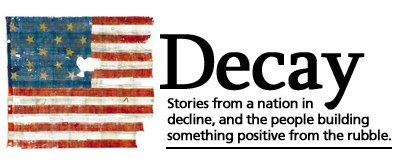

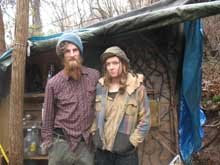
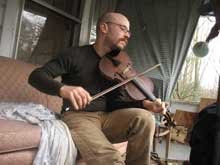

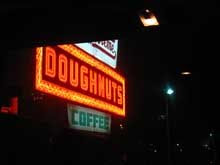
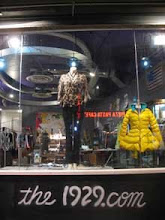


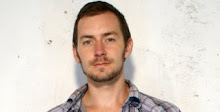
No comments:
Post a Comment